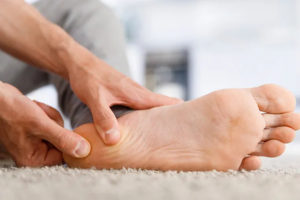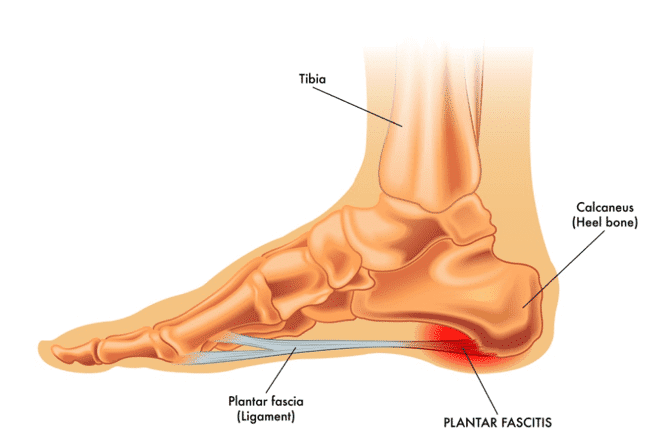 What is plantar fasciitis? Plantar fasciitis is an inflammation of the fibrous tissue (plantar fascia) along the bottom of your foot that connects your heel bone to your toes. Plantar fasciitis can cause intense heel pain. Plantar fasciitis (PLAN-tur fas-e-I-tis) is one of the most common causes of heel pain. It commonly causes a stabbing pain that usually occurs with your first steps in the morning. The pain also happens after a long period of standing or when you stand up after sitting.
What is plantar fasciitis? Plantar fasciitis is an inflammation of the fibrous tissue (plantar fascia) along the bottom of your foot that connects your heel bone to your toes. Plantar fasciitis can cause intense heel pain. Plantar fasciitis (PLAN-tur fas-e-I-tis) is one of the most common causes of heel pain. It commonly causes a stabbing pain that usually occurs with your first steps in the morning. The pain also happens after a long period of standing or when you stand up after sitting.
Do I Have Plantar Fasciitis Symptoms?
The typical symptoms of plantar fasciitis present themselves gradually. In most cases, pain is felt on the bottom of the heel. Discomfort can also extend into the arch. The pain is most intense when resuming activity after rest and tends to decrease with continued motion. Plantar fasciitis can also worsen at the end of the day after long periods of standing or walking. Swelling, inflammation, and stiffness are other symptoms that may be associated with this type of heel pain.
What Causes Plantar Fasciitis?
Plantar fasciitis is often caused by a repetitive motion or anything that puts a lot of pressure on the arch of your foot. So, activities like running, jogging and walking, or consistent long periods of standing or being on your feet, can often lead to plantar fasciitis. Tension and stress on the fascia can cause tearing of the fascia and can irritate or inflame it. Fascia is a sheath of stringy connective tissue that surrounds every part of your body. It provides support to your muscles, tendons, ligaments, tissues, organs, nerves, joints, and bones.
Major Risk Factors For Plantar Fasciitis
Although putting too much strain on the fascia is definitely a cause of plantar fasciitis, other contributing factors may be trauma, poor foot alignment, and/or shoes that don’t fit well. Certain people have an increased risk of developing plantar fasciitis.
You’re at risk if you:
- Are a woman
- Are overweight, obese, or pregnant
- Are between ages 40 and 70
- Have flat feet or very high arches
- Have tight Achilles tendons
- Have an inward pronation (ankle turns inward as you walk)
- Take part in running, jumping, or dancing such as ballet
- Do anything with repetitive foot impact
- Have tight calf muscles
- Often wear high heels
- Spend a lot of time standing, especially on hard surfaces
- Wear shoes with thin soles or without arch support
What Can Untreated Plantar Fasciitis Lead To?
Heel spurs are the most common consequences of untreated plantar fasciitis. In an attempt to protect the arch of your foot and mitigate any damage, your body sends an army of cells to the problem site, which begins depositing calcium. You are likely to change your walk to try to avoid the pain, which may lead to foot, knee, hip, or back problems.
Allowing plantar fasciitis to go untreated can cause secondary problems that could be prevented. If you suspect plantar fasciitis, you need to make an appointment with your doctor. Painful feet can throw your whole body out of whack, especially your knees, hips, and back. And the pain can spread. Pinpointing the cause of heel pain can be tricky, especially if arthritis affects another part of your body. Osteoarthritis (OA), rheumatoid arthritis (RA), gout, and other forms of arthritis and related conditions have very different treatments. A correct diagnosis is critical.
Contact Us (859-331-3100) For More Information or to Request an Appointment
—
 About Tristate Arthritis and Rheumatology
About Tristate Arthritis and Rheumatology
Tristate Arthritis and Rheumatology is the first and largest Rheumatology practice in the Northern Kentucky area. Founded by Dr. Arthur Kunath in 1986, our rheumatology practice now consists of six doctors who are board certified in both Internal Medicine and Rheumatology and a Physician Assistant. Patients see one doctor (except in emergencies), thereby assuring continuity of care and an individualized doctor-patient atmosphere giving the physician the ability to establish personalized and detailed relationships. Our doctors have received numerous awards, including being listed as “Top Doctors” in Cincinnati Magazine, receiving the Patient’s Choice Award, the Most Compassionate Doctor Award, and the American College of Rheumatology’s “My Doc Rocks” award.



